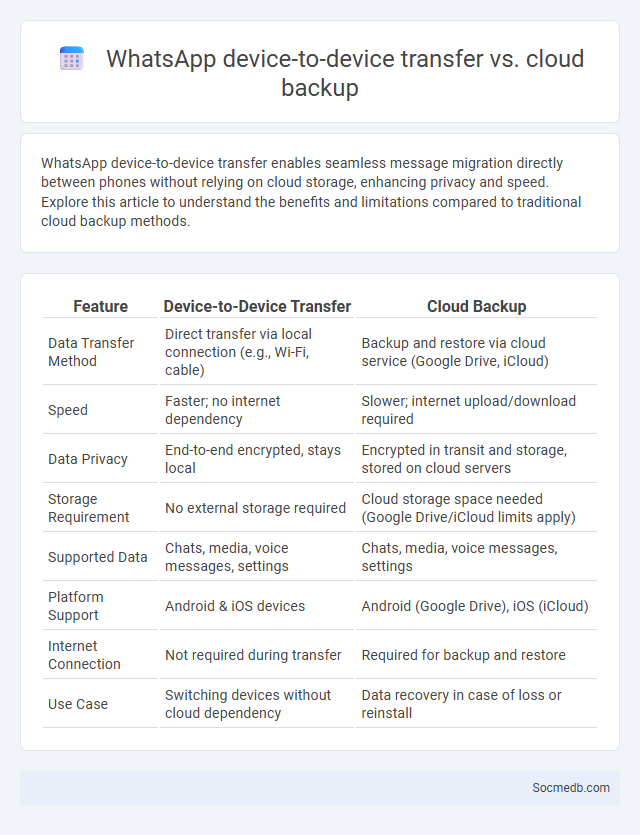
Photo illustration: WhatsApp device-to-device transfer vs cloud backup
WhatsApp device-to-device transfer enables seamless message migration directly between phones without relying on cloud storage, enhancing privacy and speed. Explore this article to understand the benefits and limitations compared to traditional cloud backup methods.
Table of Comparison
| Feature | Device-to-Device Transfer | Cloud Backup |
|---|---|---|
| Data Transfer Method | Direct transfer via local connection (e.g., Wi-Fi, cable) | Backup and restore via cloud service (Google Drive, iCloud) |
| Speed | Faster; no internet dependency | Slower; internet upload/download required |
| Data Privacy | End-to-end encrypted, stays local | Encrypted in transit and storage, stored on cloud servers |
| Storage Requirement | No external storage required | Cloud storage space needed (Google Drive/iCloud limits apply) |
| Supported Data | Chats, media, voice messages, settings | Chats, media, voice messages, settings |
| Platform Support | Android & iOS devices | Android (Google Drive), iOS (iCloud) |
| Internet Connection | Not required during transfer | Required for backup and restore |
| Use Case | Switching devices without cloud dependency | Data recovery in case of loss or reinstall |
Overview of WhatsApp Data Transfer Methods
WhatsApp data transfer methods include cloud backup, direct device-to-device transfer, and third-party software solutions, each catering to different needs and platforms. Your chat history, media files, and settings can be migrated using Google Drive for Android or iCloud for iOS, ensuring seamless restoration across devices. For users switching between operating systems, specialized tools enable secure and efficient transfer without data loss.
What Is Device-to-Device Transfer in WhatsApp?
Device-to-device transfer in WhatsApp enables direct sharing of messages, media, and chat history between smartphones without relying on cloud storage or internet. This feature uses local connectivity methods like Bluetooth or Wi-Fi Direct to securely transfer data, ensuring faster and private migration during device upgrades or replacements. It enhances user experience by preserving chat integrity and minimizing dependency on external servers during the data transfer process.
Understanding WhatsApp Cloud Backup
WhatsApp Cloud Backup securely stores chat history, media files, and settings on cloud servers to protect data from loss during device changes or accidental deletions. It automates regular backups using end-to-end encryption to ensure user privacy and data integrity. Users can customize backup frequency and storage options within WhatsApp settings to optimize space and accessibility.
What Is WhatsApp Chat Backup?
WhatsApp chat backup is a feature that saves your conversations, media files, and settings to cloud storage, such as Google Drive for Android users or iCloud for iOS users. This service allows seamless restoration of chats and media when switching devices or reinstalling the app, ensuring no loss of important messages or data. Regular backups can be customized in frequency through WhatsApp settings, providing automatic or manual saving options.
Key Differences: Device-to-Device vs. Cloud vs. Chat Backup
Device-to-device social media backup ensures data is saved locally on individual gadgets, providing direct control and offline access but limited synchronization capabilities. Cloud backup stores social media content on remote servers, offering scalable storage, automatic updates, and multi-platform access but relies on internet connectivity and raises privacy concerns. Chat backup combines elements of both by saving conversations either locally or on cloud platforms, facilitating message recovery and cross-device continuity while balancing security and convenience.
Security and Privacy Considerations
Social media platforms require robust security measures to protect user data from breaches and unauthorized access, including encryption, multi-factor authentication, and regular security audits. Privacy settings must be user-friendly and transparent, enabling individuals to control the visibility of their personal information and limit data sharing with third-party applications. Compliance with regulations like GDPR and CCPA is critical to ensuring users' rights are upheld and minimizing risks associated with data misuse on social media networks.
Speed and Convenience Comparison
Social media platforms provide unmatched speed by enabling instant sharing and real-time interaction, allowing you to quickly connect with friends, family, and audiences worldwide. Convenience is amplified through mobile apps and integrated features like notifications, AI-driven content suggestions, and seamless multimedia posting. Compared to traditional communication methods, social media significantly reduces response times and effort, enhancing your overall digital experience.
Cross-Platform Compatibility
Cross-platform compatibility in social media ensures seamless user experiences across devices and operating systems, enhancing engagement and accessibility. Platforms like Instagram, Facebook, and Twitter employ responsive design and adaptive interfaces to maintain functionality on smartphones, tablets, and desktops. Optimizing content and features for cross-platform use drives higher user retention and broadens audience reach.
Data Integrity and Completeness
Ensuring data integrity and completeness in social media platforms is critical for maintaining user trust and enhancing data-driven decision-making processes. Robust verification protocols and advanced encryption techniques protect against data breaches, unauthorized alterations, and misinformation. Comprehensive data auditing tools continuously monitor activity logs and user-generated content to guarantee accuracy and consistency across vast datasets.
Choosing the Best WhatsApp Transfer Method for You
Selecting the best WhatsApp transfer method depends on factors like device compatibility, data size, and whether you prefer local backups or cloud services. Using Google Drive for Android users offers seamless restoration, while iCloud is optimal for iPhone transfers, ensuring message history and media are preserved. Third-party tools can facilitate cross-platform transfers, but it's crucial to verify their security and reliability to protect your WhatsApp data.
 socmedb.com
socmedb.com